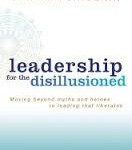
On ancient maps of the world cartographers, perhaps believing the world was flat, would write: ‘beyond here be monsters’. Fear of what lay beyond the edge of the known world kept their world small. Today we smile at how wrong this perspective is; we know that over that imagined rim lay whole new worlds.
In Leadership for the Disillusioned Amanda Sinclair takes us to an edge. She challenges traditional views of leadership, exposing some of the monsters created by values that run through most leadership development: compulsive growth, conquest, materialism, individualism and relentless focus on future targets.
Hopeful, bold and challenging, it was recommended to me ten years ago, when I embarked on a Masters in Responsibility & Business Practice. Bear Stearns, Lehman Brothers, Northern Rock and RBS were collapsing, I’d become disillusioned with leadership, mine and others. I felt sure there was a different way to do the work of leading but I felt shackled by prevailing practices.
It’s still one of the most exciting leadership books I’ve read, an antidote to pompous, ‘do it my way’ tomes, with their ‘heroic performances, impoverished theories and oversimplified templates.’ With a critical, systemic perspective Sinclair asks fundamental questions about the discourses that frame or limit what we think leadership is, or could be: What is leadership for? What are the purposes to which leadership is being put? Who benefits from these purposes? What are its unintended harmful consequences?
At times, it’s an uncomfortable read. It exposed my assumptions and less-than-wonderful practices as a leader. Asking ‘What’s wrong with leadership?’ she explores how leadership is often achieved through a leader’s self-inflation and ‘collusive seduction.’ She examines how the cult of adoration surrounding unassailable CEOs and leaders needs followers who are searching for a someone to fix things and make hard problems simple. She shows how the dependency of these followers, their surrender, suspension of critical faculties and abdication of responsibility leads to moral failure in companies and ultimately, failure of trust in leadership. Since the Brexit campaign and rise of Trump this analysis is more relevant than ever.
Central to the book is a call for leadership that ‘liberates’. She argues that good leaders seek to free themselves, organisations, teams and individuals from oppressive structures or practices and a create flourishing workplaces.
Leading that liberates is not just a job or position, but a way of being in relationship, anchored in self-awareness, mindful of others and wider systems. It’s an invitation to lead with less ego, to extend our sense of identity, be more fluid, porous and freer. This involves bringing unconscious assumptions about leadership, often laid down in childhood, to light, as well as developing more awareness of power dynamics and the responsibility to use power ethically. Sinclair argues that the way to do this is through being reflective and embodied, working experientially and thinking critically.
As a trainer, coach, mentor and developer of leaders this book was a place that encouraged me to explore ‘edges’ in my work. It helped clarify key questions as I developed training courses for coaches: How to create a programme that is reflective and thoughtful, that values relationship, connects to others and the wider world? How can I develop coaches who have the confidence and competencies to challenge the status quo? What would a coaching course look like that doesn’t ‘feed’ narrow individualistic striving, that is liberating – contributing to valuable, worthwhile purposes?
It shaped my thinking and the way I’ve build my business; I worked on creating assessment processes with power in mind; balanced theory and practice; wove together reflective practice with a critical perspective. I thought about how groups are recruited, and alongside those from corporate backgrounds, decided to offer sponsored places to charities or social enterprises to include a range of experience and aspirations. By inviting alternative worldviews into the room, I hoped to avoid slipping into ‘executive-coach groupthink’. These questions are reflected in the Wise Goose ‘brand’, an identity that’s less shiny and glossy than many coach training providers. I talk about ‘success with a soul’. Making these choices isn’t always easy, I need to maintain credibility with corporate customers, to keep one foot in the world leaders and organisations inhabit while holding a wider context and reframing spirit. I’ve needed to attend to the part of me wants to belong, to quietly follow, not rock the boat and be an insider.
Sinclair is not a comfortable insider defending the status quo. Neither is she an outsider throwing rocks, she’s a professor at Australia’s foremost business school. She occupies a precarious space between worlds, the ‘wild margins’. There’s a tension and energy at the places where edges meet, Leadership for the Disillusioned creatively negotiates the gap between hard realities of ‘leadership as usual’ and everyday practices of a liberating leader. It’s a book that inspired me to explore those edges for myself and in doing so shaped me.

